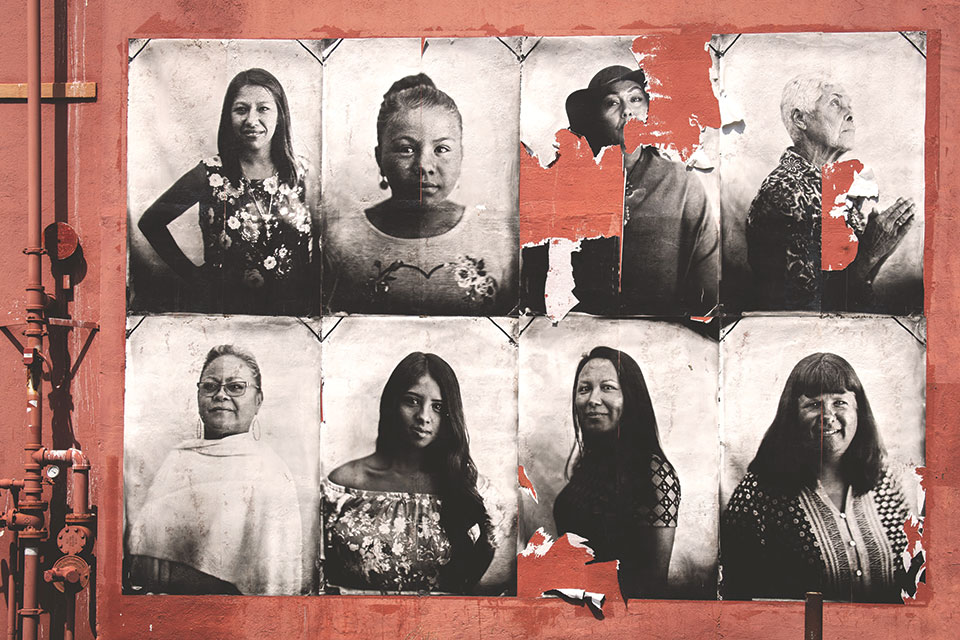A Brief Exploration of the Use of the e in the Spanish Language as a Means of Combating Sexism Regardless of the Opinions of the Academy

What is the difference between an o and an e in Spanish? For 51.06 percent of Argentina’s population, everything.
I remember my father enthusiastically sharing his love for the film Deprisa, deprisa, by the Spanish filmmaker Carlos Saura. At the end, the song “Me quedo contigo,” an extraordinarily catchy tune with the chorus “si me das a elegir / me quedo contigo” (if you give me the choice / I choose you), plays over the credits. As I write these words to consider the use of the e in Spanish nouns as a means of doing away with the stereotypes and pressures that turn women into our worst possible selves—powerless, docile—I’m paying attention to the lyrics for the first time. Although, in a typically #patriarchal twist, the subject of the song is male, the choice described (the mere fact of having to choose) is essentially the one faced by women in romantic relationships; the compromises they have to make if they are to fit within the traditional frameworks. In fact, women have to choose between work and family, because they can’t have both. Smart but tacky like most tango lyrics, “Me quedo contigo” portrays a tortured male desperate to win the love of a woman. But the reality of the cliché is the opposite and far more grim: in 2019, 280 femicides were recorded in Argentina, almost one a day—women murdered by their male partners or (in the majority of cases) ex-partners.
Although it might not seem like it, these issues are related to representation and perspective. Who is represented, who is visible in the public eye and the collective consciousness. And how. And when. Women who are murdered or raped only seem to be seen once they are either already dead or violated. Before that, even when these crimes are reported, the state’s response is inadequate, often going no further than a restraining order or a panic button. The powers that be don’t see the urgency of the request for protection. What they see is exaggeration, pettiness, wanting attention, to make a scene, nagging, or madness.
Inclusive (or antisexist) language and use of the e are very relevant to this. They make visible all those subjectivities that identify as being nonmale within language itself. This is just one of the ways women’s collectives are waging the battle to protect themselves, to live their lives free of violence, because language is a deeply political tool. To be visible linguistically is a means of changing how we are seen in real life. We are changing the status quo.
Everyone knows that History is written by the victors (i.e., “men”). We live in hetero-patriarchal societies, communities governed by rules that allocate privileges (comparative opportunities) to those born with a dick between their legs. Across the social classes, that dangling organ smooths one’s path, tamping down the difficulties one faces in life. This in itself is already a feminist concept: recognizing there are collectives that have been marginalized, deprived of the rights and opportunities available to others. As is the concept of intersectionality: different aspects of social and political identities (gender, sex, race, class, religion, etc.) combining to create unique modes of discrimination and privilege.
Women are the foremost marginalized majority in the world. In Argentina, according to data from the World Bank, women make up 51.06 percent of the population. However, a glance at a photograph of our representatives in Congress and government offers a fair idea of how disproportionate that representation is. To think that just because Cristina Fernández de Kirchner or Angela Merkel were elected president makes up for the subaltern status of women in general is to believe in the fairy tale of meritocracy. Why are there more men than women (not to mention the LGBT+ community) managing public affairs? A subject’s abilities and capacities are bound to their environment: without opportunities or stimuli, the majority can never triumph. And it is a majority we’re talking about, a majority of non cis-males, that is not represented adequately by language, which is why we are here.
“All battles are waged in language,” according to María Teresa Andruetto. And that’s where the noble e comes in. It’s a means of exposing an unfair situation of subalternity: lower wages, tougher requirements, worse treatment, bodies seen as being open to manhandling with no explanation required.
And that’s where the noble e comes in. It’s a means of exposing an unfair situation of subalternity.
The e, the humble e, is here to expose all that. Like Don Quixote and his windmills, it bothers those who, infected with the logic of the winners, regard the status quo as being eminently satisfactory, tip-top, ten out of ten, stop busting my balls and go do the dishes. The e, so innocent, so inconsequential, almost invisible, slips in at the end of words to change how they look and sound, their morphology. Let’s examine the phrase “Todos queremos ser felices” (We all want to be happy). The masculine o is employed as a universal term. The Spanish suggests that I, as a woman, as anyone who doesn’t identify as male, must be absorbed into the linguistic masculine, the default when gender is not determined. When I say, “Todos queremos ser felices,” it’s understood that as a woman I include myself in the male Todos. I say, “Todos queremos ser felices,” and I, a woman, am speaking in correct Spanish. The same would apply if I identified as fluid, nonbinary, trans, or anything other than man or woman. The masculine is said to be “universal,” because it covers the whole range of human possibilities with its little o. Well, I don’t feel accurately represented by that todos. I prefer the e (todes), introducing to the collective imagination an awareness of how important it is to be represented in discourse and language.
It’s the refusal to stay silent in the face of an injustice that feminist movements have made impossible to ignore: the emperor must take responsibility for his nudity.
People of a certain age, like me, might find using the e awkward. Or even scary. Because it’s not how we’ve always talked, it’s not how our elders spoke, because it sounds weird, because it puts us in the spotlight, because it suddenly makes us uncomfortably visible. People might call us crazy, frivolous, ridiculous. Because it does what it’s supposed to do: make people uncomfortable, introducing the notion, regardless of the conversation, that we’re not all on equal terms. The e forces us to take a position or to admit to ourselves that we are tacitly collaborating in the oppression of at least 51.06 percent of the population (not to mention all those who identify as non cis-male or cis-female). It’s the refusal to stay silent in the face of an injustice that feminist movements have made impossible to ignore: the emperor must take responsibility for his nudity. Nobody can escape the new awareness.
For centuries we women have been complicit in the reproduction of an unjust system that harms and belittles us. Forced tacitly or otherwise, against our will or not, we have allowed and supported the system. A system that has deprived us of opportunities, that punishes us symbolically or actually every time we diverge from our assigned role: that of being behind the great man. “Behind” being the key word. Many women still prefer to occupy a clear, well-defined, safe role as mothers and daughters, far from the intimidating leap into the void, where the possibilities are endless, where there are no preestablished paths or glass ceilings. Far from the risk of reprisal. Love is one of the safest places of refuge that the patriarchy has to offer, one of its most potent strategies, so long as its structure is that defined by the options listed in “Me quedo contigo”:
Si me das a elegir
entre tú y mis ideas
entre tú y la gloria
entre tú y ese cielo
donde libre es el vuelo
entre tú y la pereza . . .
Me quedo contigo.
(If you give me the choice / between you and my ideas / between you and glory / between you and the sky / where one can fly free / between you and ease / . . . I choose you)
I don’t want the love described in “Me quedo contigo” because I don’t want to have to choose. No one should have to.
Translation from the Spanish
In this excerpt from Ojeda’s latest novel, Vikinga Bonsái, she uses les científiques rather than científiquos, making the text more inclusive.
Solsticio de invierno, veinticinco grados a mediodía: toda la humedad continental chorrea sin recato ninguno, en completa desvergüenza extravagante sobre la pobre ciudad, que discurre acomplejada bajo peso semejante. ¿Es normal? ¿Qué dicen les científiques? Consultas pedestres de gente decente.
Twenty-five degrees Celsius at midday on the winter solstice: the gathered humidity of an entire continent bears mercilessly, shamelessly, extravagantly down on the poor city, which mutters worriedly under the pressure. Is this normal? What do the scientists say? The mundane queries of decent people.
Translated by Kit Maude






